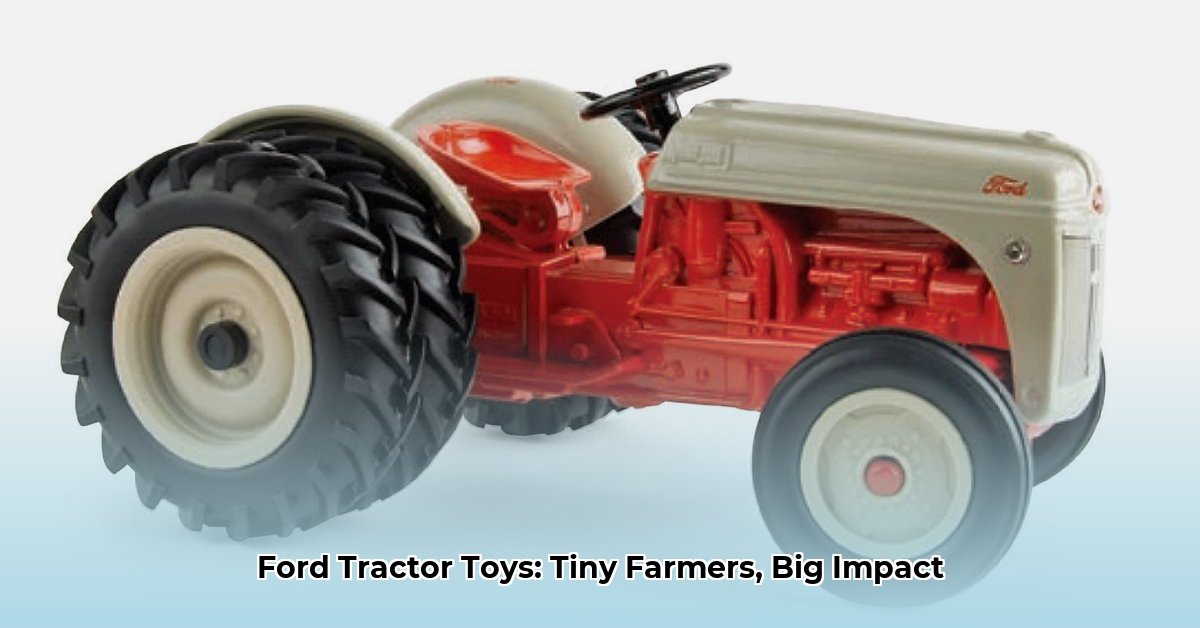
More Than Just Playthings: A History in Miniature
Ford tractor toys, those diminutive metal or plastic replicas, offer a surprising lens into the evolution of sustainable farming. More than just childhood playthings, they serve as miniature time capsules, reflecting the transformation of agricultural practices and their environmental impact. These small models represent the very machines that revolutionized food production. Examining their development helps us understand agriculture's journey and its intricate relationship with the environment. For even more information on toy tractors, check out this helpful resource.
These aren't mere toys; they represent a significant historical shift. Early models, often simpler and less detailed, mirror an era of farming heavily reliant on human and animal labor – a time when farming was undeniably arduous. Later models, with more intricate details and perhaps moving parts, showcase the transformative power of technology in agriculture. This mechanization, while increasing efficiency, also profoundly impacted the environment. Did this increased efficiency lead to unsustainable practices? This crucial question underscores the complex relationship between technological advancement and environmental stewardship.
A Peek into the Past: Farming's Amazing Transformation
Comparing a rudimentary early 20th-century Ford tractor toy with a modern counterpart reveals a stark contrast. The older toy reflects the slower, more labor-intensive farming methods of the past. Newer models, with more complex features, represent a giant leap in farm technology. Consider the consequences of this transformation: reduced manual labor, increased harvests, and the capacity to feed a burgeoning global population. But did this progress come without a cost? Did the efficiency gains compromise sustainable practices? It's within this context that the connection to modern sustainable agriculture becomes truly compelling.
Learning While Playing: Tiny Tractors, Big Lessons
Ford tractor toys serve as exceptional educational tools for children (and adults!). They offer an engaging way to explore the complexities of sustainable farming. For instance, these toys can be used to illustrate concepts like water conservation, showing children the importance of responsible water usage in agriculture. They can also help demonstrate practices such as no-till farming, highlighting the benefits of minimizing soil disturbance. Discussions around responsible fertilizer use can also be engagingly explored using the toys. In essence, these toys transform complex concepts into interactive learning experiences.
Collecting with a Purpose: The Growing Demand for Eco-Friendly Toys
The hobby of collecting Ford tractor toys reveals another fascinating angle. A growing trend among collectors is the specific search for toys crafted from recycled materials or produced through sustainable manufacturing methods. This shift highlights a broader societal change: the increasing prioritization of environmentally friendly practices, including in leisure pursuits. This indicates that sustainability is actively shaping consumer choice, even in the realm of collectibles.
The Future of Play: Sustainable Toys on the Horizon
Looking ahead, we anticipate a surge in the production of eco-conscious Ford tractor toys. Manufacturers are increasingly adopting recycled plastics and other environmentally friendly materials, catering to the growing consumer demand for sustainability. This illustrates the crucial integration of sustainability into product creation and consumption, impacting even the toy industry.
Why These Little Tractors Really Matter
In conclusion, Ford tractor toys transcend their role as mere playthings. They serve as a historical record, providing a unique platform to discuss farming, sustainability, and the broader impact of our choices on the environment. They act as a reminder that sustainability is the collective responsibility of all of us, regardless of our age or profession. They are an encouragement to consider our consumption habits and support environmentally sound practices. In short, these tiny tractors represent our journey toward creating a more sustainable future.